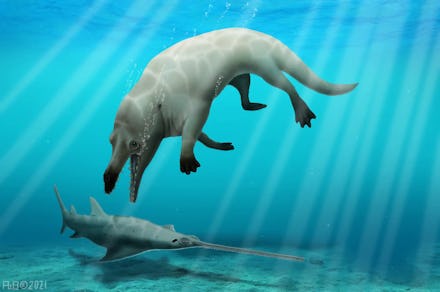This extinct "god of death" whale that walked on land will haunt your dreams forever

At some point, whales literally walked the Earth. Scientists have believed this for quite some time, but the evidence has been elusive. On Wednesday, though, researchers presented a recent discovery that gives some of the first meaningful insight into how whales transitioned from land to water. The evidence: a 43 million-year-old fossil of a previously unknown whale ancestor with four legs, detailed for the first time in a paper published in the journal Proceedings of the Royal Society B.
Meet Phiomicetus anubis, an ancient whale ancestor who once called the area that we now know as Egypt its stomping grounds. It is believed to be a member of the Protocetid family — a group of semi-aquatic whales that once ruled land and sea during the Eocene period. Measuring in at about 10 feet in length and believed to weigh over 1,300 pounds, Phiomicetus anubis was a massive beast. Researchers believe that the whale-like creature was a top predator, aided by a "jackal-like head," as Insider put it, and a powerful jaw that allowed it to rip into prey.
That size and strength helped researchers give the creature its name, which references the Egyptian god of death. "This whale was a god of death to most of the animals that lived in its area," Abdullah Gohar, the lead researcher on the Phiomicetus anubis discovery, told Insider.
The remants of the Phiomicetus anubis were found in a region of Egypt's Western Desert known as the Fayum Depression. This area was once underwater and has since been a relative hot spot for remnants of a Protocetid past. It produced the first insight into the whale ancestors that once walked the Earth, dug up by German paleontologist Eberhard Fraas back in 1904. Since then, multiple other examples of fossils that provide glimpses at the four-legged land and water dwellers have cropped up.
Still, there is a lot left to be learned about these species, which are believed to have existed between 56 million to 33.9 million years ago. That's why Phiomicetus anubis is so exciting. Prior to scientists excavating and examining the partial skeleton of this creature, there was no prior indication to suggest this specific whale ancestor existed. Now, it could be a key to understanding how the species transitioned from life as a land-dwelling animal to the marine mammals that live full-time in our oceans. The bones of the Phiomicetus anubis are believed to be the earliest example of a semi-aquatic whale ever to be discovered in Africa.
The research into this creature is a breakthrough for another reason: According to Insider, the Phiomicetus anubis discovery marks the first time that an Arab research team has discovered, described, and named a whale fossil. Their find is the world's gain, as it gives us new insight not just into the history of whales, but our planet and the creatures who once walked it long before humans showed up.